Recent Storm Damage Posts
Hurricane and Tropical Storm Surge Readiness and Safety Tips
11/10/2021 (Permalink)
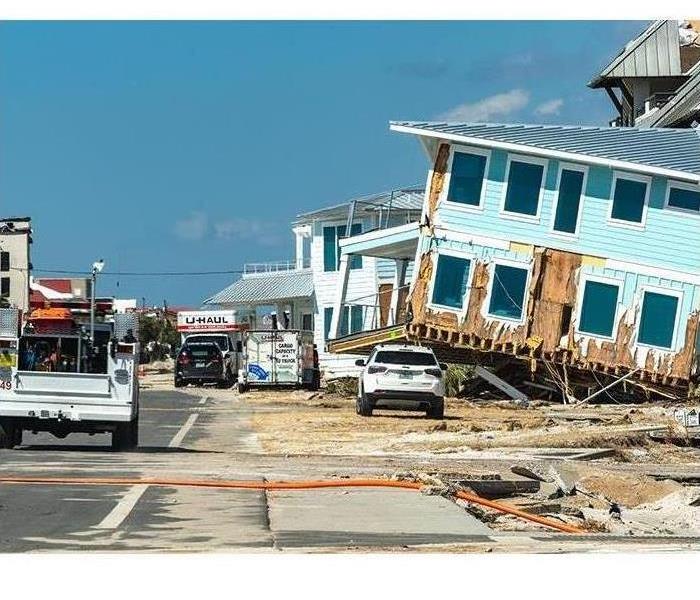 NOAA Storm Surge Awareness and Tips
NOAA Storm Surge Awareness and Tips
Storm surge is one of the most destructive threats to life and structures during a tropical cyclone. It is not the just the wind, but the storm surge that is responsible for many deaths and damage. Now is the time to prepare and know if your home, place of business, work, or someone you care for is at risk.
Following is information from the National Oceanographic and Atmospheric Administration about being prepared and knowing if your risk.
The NOAA National Hurricane Centerinteractive web tool, the National Storm Surge Hazard Maps can to help you find out.
These storm surge hazard mapsoffsite link enable people living in hurricane-prone coastal areas to evaluate their risk of coastal flooding due to storm surge. And don’t forget, storm surge is not just a beachfront problem. The hazard extends many miles inland from the immediate coastline in some areas. Understanding this risk gives you the time to take action when emergency managers tell you to evacuate.
If you or a loved one live in or visit a location that may be affected by a tropical cyclone, get to know the potential hazards before hurricane season starts. It is also a great idea to have an evacuation or 'hurricane' plan in place. For more information visit NOAA’s National Hurricane Center.
Storm surge safety tips, in English - in Spanish
Reference: https://www.noaa.gov/stories/storm-surge-deadliest-threat-from-tropical-cyclones
Blackout! How to prepare for "After the Storm"
11/4/2020 (Permalink)
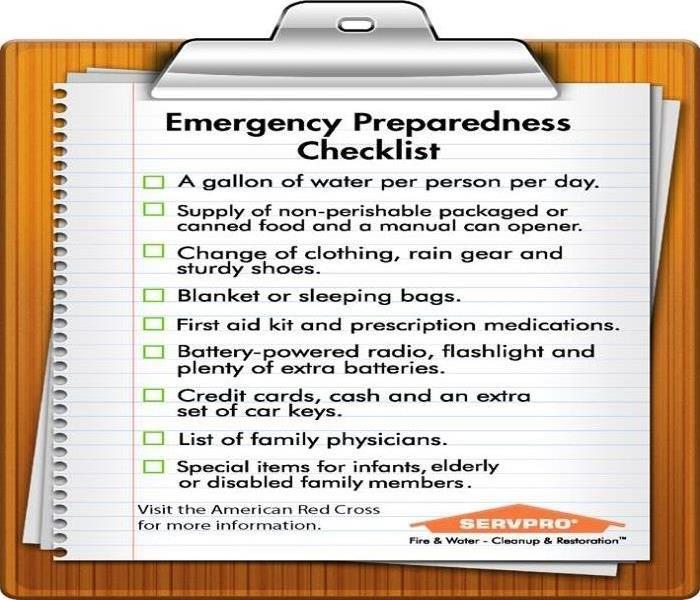 When the storms roll in, "Be Prepared, not Scared!
When the storms roll in, "Be Prepared, not Scared!
Are you prepared in case there is a blackout (loss of power) after a storm? Follow are the 10 tips for how to prepare in the event of a power outage.
TLDR: Watch the following video from FEMA for the 10 tips:
https://youtu.be/4eH7VbMXir4
The American Red Cross suggests the following:
Coping with Power OutagesSudden power outages can be frustrating and troublesome, especially when they last a long time. If a power outage is 2 hours or less, don’t be concerned about losing your perishable foods. For prolonged power outages, though, there are steps you can take to minimize food loss and to keep all members of your household as comfortable as possible. Energy Conservation Recommendations- Turn off lights and computers when not in use.
- Wash clothes in cold water if possible; wash only full loads and clean the dryer's lint trap after each use.
- When using a dishwasher, wash full loads and use the light cycle. If possible, use the rinse only cycle and turn off the high temperature rinse option. When the regular wash cycle is done, just open the dishwasher door to allow the dishes to air dry.
- Replace incandescent light bulbs with energy efficient compact fluorescent lights
While blackouts are not fun, if you are prepared, they can be a lot less stressful for the family. If you have pets, children, anyone with disabilities, senior citizens, or anyone else who may have special needs staying in your home, make sure you have supplies, medicine, and comfort items that will help them cope through the blackout time also.
Hurricane Storm Surge Readiness and Safety Tips
5/14/2019 (Permalink)
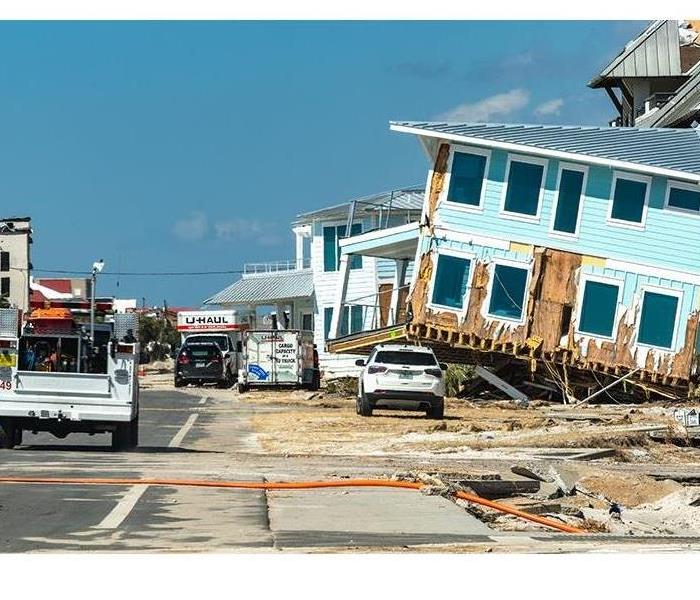 NOAA Storm Surge Awareness and Tips
NOAA Storm Surge Awareness and Tips
Storm surge is one of the most destructive threats to life and structures during a tropical cyclone. It is not the just the wind, but the storm surge that is responsible for many deaths and damage. Now is the time to prepare and know if your home, place of business, work, or someone you care for is at risk.
Following is information from the National Oceanographic and Atmospheric Administration about being prepared and knowing if your risk.
The NOAA National Hurricane Centerinteractive web tool, the National Storm Surge Hazard Maps can to help you find out.
These storm surge hazard mapsoffsite link enable people living in hurricane-prone coastal areas to evaluate their risk of coastal flooding due to storm surge. And don’t forget, storm surge is not just a beachfront problem. The hazard extends many miles inland from the immediate coastline in some areas. Understanding this risk gives you the time to take action when emergency managers tell you to evacuate.
If you or a loved one live in or visit a location that may be affected by a tropical cyclone, get to know the potential hazards before hurricane season starts. It is also a great idea to have an evacuation or 'hurricane' plan in place. For more information visit NOAA’s National Hurricane Center.
Storm surge safety tips, in English - in Spanish
Reference: https://www.noaa.gov/stories/storm-surge-deadliest-threat-from-tropical-cyclones
When Storms or Floods hit Port Charlotte, SERVPRO is ready!
9/19/2017 (Permalink)
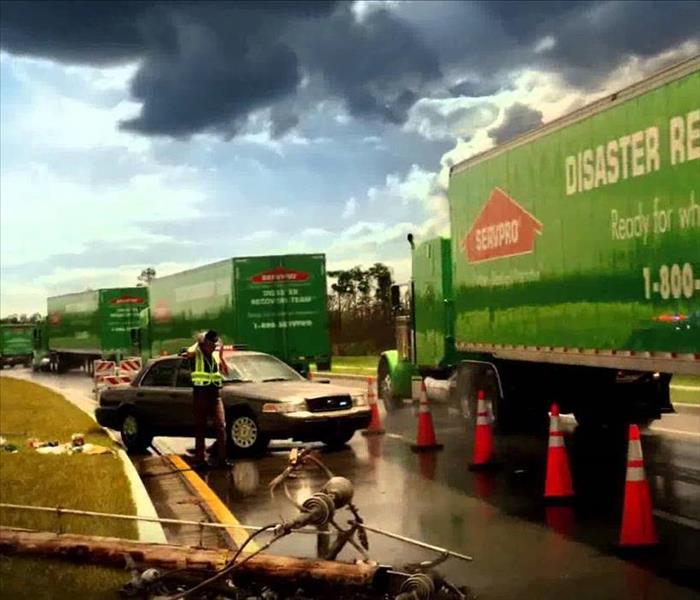 Our highly trained crews are ready to respond 24/7 to storm or flood damage in Port Charlotte Florida
Our highly trained crews are ready to respond 24/7 to storm or flood damage in Port Charlotte Florida
SERVPRO of Port Charlotte specializes in storm and flood damage restoration. Our crews are highly trained and we use specialized equipment to restore your property to its pre-storm condition.
Faster Response
Since we are locally owned and operated, we are able to respond quicker with the right resources, which is extremely important. A fast response lessens the damage, limits further damage, and reduces the restoration cost.
Resources to Handle Floods and Storms
When storms hit Port Charlotte, we can scale our resources to handle a large storm or flooding disaster. We can access equipment and personnel from a network of 1,650 Franchises across the country and elite Disaster Recovery Teams that are strategically located throughout the United States.
Have Storm or Flood Damage? Call Us Today (941) 629-0966
Be Prepared for a Blackout!
9/13/2016 (Permalink)
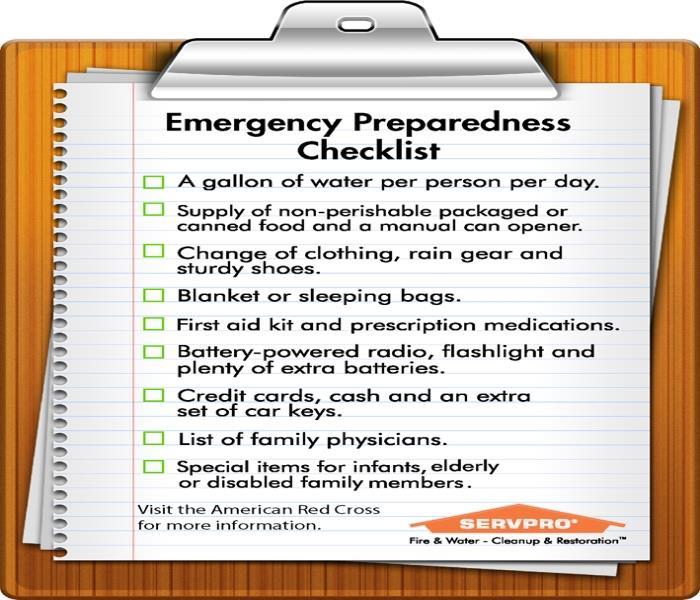 Are you prepared for a blackout?
Are you prepared for a blackout?
Are you prepared for a blackout? Here are 10 tips to help prepare in the event of a power outage.
Watch the following video from FEMA for the 10 tips:
https://youtu.be/4eH7VbMXir4
The American Red Cross suggests the following:
Coping with Power OutagesSudden power outages can be frustrating and troublesome, especially when they last a long time. If a power outage is 2 hours or less, don’t be concerned about losing your perishable foods. For prolonged power outages, though, there are steps you can take to minimize food loss and to keep all members of your household as comfortable as possible. Energy Conservation Recommendations- Turn off lights and computers when not in use.
- Wash clothes in cold water if possible; wash only full loads and clean the dryer's lint trap after each use.
- When using a dishwasher, wash full loads and use the light cycle. If possible, use the rinse only cycle and turn off the high temperature rinse option. When the regular wash cycle is done, just open the dishwasher door to allow the dishes to air dry.
- Replace incandescent light bulbs with energy efficient compact fluorescent lights
While blackouts are not fun, if you are prepared, they can be a lot less stressful for the family. If you have pets, children, anyone with disabilities, senior citizens, or anyone else who may have special needs staying in your home, make sure you have supplies, medicine, and comfort items that will help them cope through the blackout time also.
Thank you for reading!






 24/7 Emergency Service
24/7 Emergency Service



